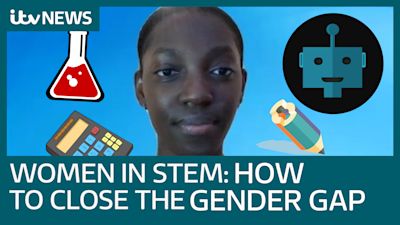A career in science doesn’t have to mean a white coat: How women in STEM are trying to inspire a new generation of girls

Since the pandemic, more students have been choosing science, technology, engineering and mathematics (STEM) subjects at university.
We've seen a lot more scientists on our screens, so maybe it's no surprise that 59% of young people are more tempted by careers in science than they were before Covid.But when it comes to those who study or work in science, technology, engineering or mathematics there is a huge gender gap.Only 26% of STEM graduates are women, and this number hasn't really changed over the last five years.
22-year-old Akua Apeagyei never considered a career in the tech industry until the last few years."The more I explored into, I thought, Oh, I'm not really seeing many people that looked like me. So maybe it's not really, for me."Not meeting anyone that looked like Akua didn't put her off breaking into the tech industry.After doing a coding boot camp course and then a couple of apprenticeships, Akua landed her dream job with Microsoft where she now works on projects to do with cloud computing.For Akua, a career in science doesn’t have to mean a white coat, which is why she now uses her experiences to show what other possibilities exist in STEM.
"I try and share with people like on how I got to where I am to let people know that there are other routes, you don't have to go to uni to get a computer science degree."Akua believes one of the biggest misconceptions about working in STEM is that you need to be a genius."This is not to say that the role in STEM roles are not hard.
"They are, but it's not about you being a genius. It's about you having a passion for helping people, it's about you wanting to problem solve and being creative.
"If that sounds like you, then it's for you."The pandemic has highlighted the importance of jobs like medical researchers and epidemiologists - even in the middle of economic uncertainty, it's believed STEM fields will continue to grow and offer new opportunities.
But at the moment, women only make up 24% of the STEM workforce in the UK. So how can this gap be closed? Akua believes those who are currently in STEM industries can help affect change."I've realised is that we're not all seeing the same opportunity, so my advice for those in the industry: share opportunities that you come across, even if it's not for you."Secondly I would suggest sharing your story and the third thing is for women specifically, I think they should take that responsibility to work closely with the hiring, to ensure that they're not only just getting the typical candidates in, but people that are from a diverse backgrounds."